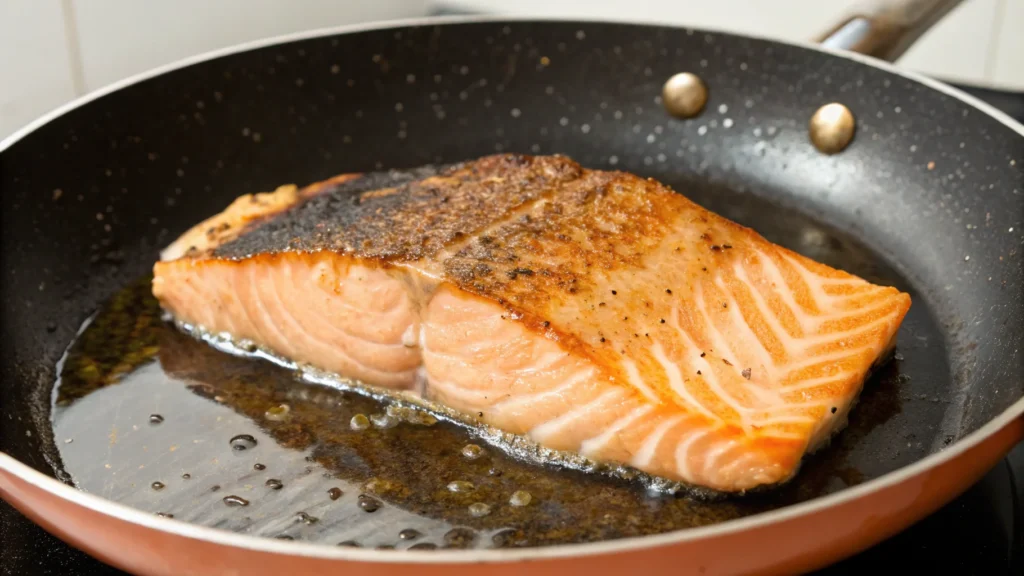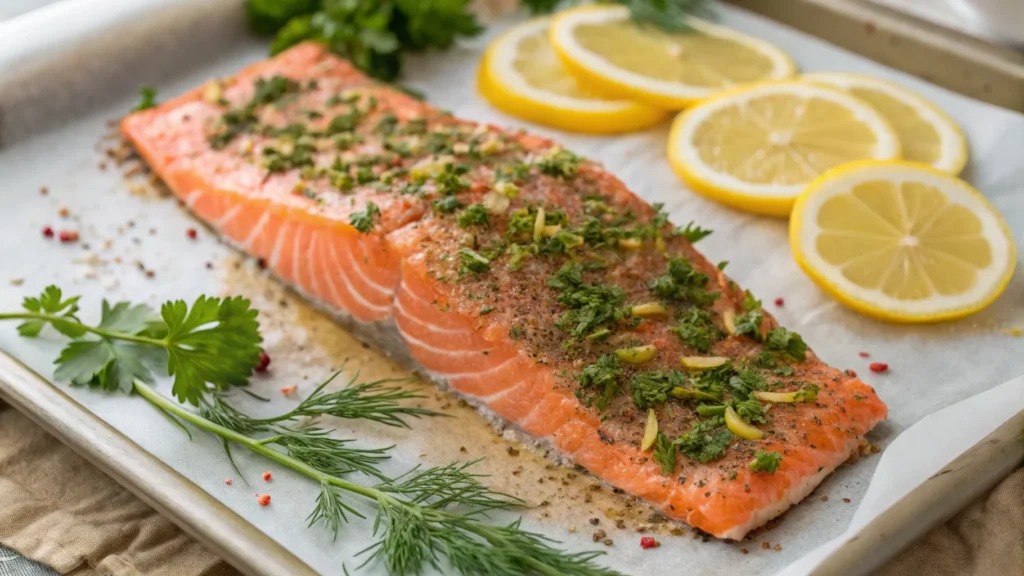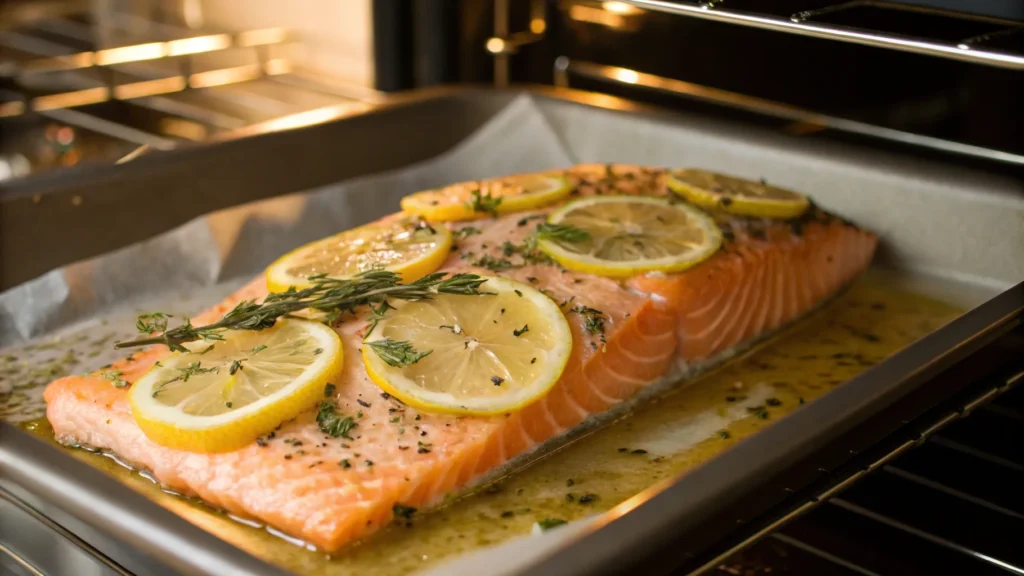When it comes to preparing salmon, many people believe you need to thaw it first, but that’s not necessarily true. In fact, cooking salmon straight from frozen can save time and still produce a delicious, flaky dish. As someone who loves experimenting in the kitchen, I’ve found that frozen salmon is incredibly versatile and surprisingly easy to cook. If you’ve ever wondered, “Can you cook salmon from frozen?” this guide will give you all the answers and step-by-step methods to try it yourself!
Table of Contents
Why Cook Salmon from Frozen?
Advantages of Cooking Salmon from Frozen
Cooking salmon straight from the freezer comes with several benefits:
- Convenience: There’s no need to plan ahead for defrosting, saving you valuable time on busy days.
- Freshness Retention: Frozen salmon is typically flash-frozen shortly after being caught, preserving its flavor and nutrients.
- Reduced Waste: Cooking directly from frozen ensures you use the salmon before it sits too long in the fridge and spoils.
For home cooks, these benefits make frozen salmon an excellent option for weeknight meals or last-minute dinner ideas. Plus, cooking it frozen doesn’t require advanced skills—just a little patience and attention to technique.
Common Misconceptions About Cooking Frozen Salmon
Some people think cooking salmon from frozen leads to a rubbery or unevenly cooked texture. However, this can easily be avoided by following proper cooking methods. For example, baking or pan-frying frozen salmon at the right temperature ensures even cooking while locking in moisture.
Another misconception is that seasoning doesn’t adhere well to frozen salmon. The key is to apply a light coating of oil and seasonings to ensure the flavors penetrate as the fish cooks. With these simple adjustments, you’ll have perfectly cooked salmon every time!
Is It Safe to Cook Frozen Salmon?
Health and Safety Guidelines for Cooking Frozen Fish
Cooking frozen salmon is not only safe but also a great way to enjoy a nutritious meal. According to the FDA, salmon frozen at the proper temperature (below 0°F) is perfectly safe to cook without defrosting. The key is to ensure the fish reaches an internal temperature of 145°F during cooking, which kills any harmful bacteria or parasites.
When preparing frozen salmon, always use clean utensils and cooking surfaces to avoid cross-contamination. Additionally, avoid refreezing thawed salmon unless it has been cooked, as this can compromise its texture and safety.
How Freezing Affects Salmon’s Quality and Texture
Freezing preserves the freshness of salmon, but it can cause slight changes to its texture. Ice crystals form inside the fish during freezing, which may slightly break down the flesh. However, this doesn’t mean your salmon will be mushy!
The cooking method you choose plays a big role in the final texture. Baking or pan-frying frozen salmon locks in the moisture, giving you flaky, tender results. To prevent drying out, avoid overcooking and always monitor the temperature closely.
By following these guidelines, you can confidently cook frozen salmon and enjoy all the nutritional benefits it offers, such as omega-3 fatty acids, protein, and essential vitamins.
Methods for Cooking Frozen Salmon
Cooking salmon from frozen might seem tricky, but it’s straightforward if you use the right techniques. Here are three easy and effective methods to cook frozen salmon: baking, pan-frying, and using an air fryer.
Baking Salmon from Frozen: Step-by-Step Instructions

Baking is one of the easiest ways to cook frozen salmon. It ensures even cooking and preserves the fish’s moisture.
Steps:
- Preheat the Oven: Set your oven to 400°F.
- Prepare the Salmon: Place the frozen fillet on a baking sheet lined with parchment paper. Brush both sides with olive oil and sprinkle with salt, pepper, and your favorite seasonings.
- Cover with Foil: Cover the salmon loosely with aluminum foil to trap steam and cook it evenly.
- Bake: Bake the salmon for 15 minutes.
- Remove Foil and Finish Baking: Remove the foil and bake for another 10-12 minutes, or until the salmon reaches an internal temperature of 145°F.
Pro Tip: Add lemon slices on top for extra flavor!
Pan-Frying Salmon Straight from Frozen: A Detailed Guide

Pan-frying frozen salmon results in a crispy exterior and tender, flaky interior.
Steps:
- Preheat the Pan: Heat a non-stick skillet over medium heat with a tablespoon of oil.
- Sear the Salmon: Place the frozen fillet skin-side down in the pan and sear for 4-5 minutes.
- Flip and Cook: Flip the salmon and reduce the heat to medium-low. Cover the pan with a lid to cook through, about 8-10 minutes.
- Check Doneness: Ensure the salmon is cooked to 145°F in the thickest part.
Using an Air Fryer to Cook Frozen Salmon
The air fryer is a quick and convenient option for frozen salmon.
Steps:
- Preheat the Air Fryer: Set the air fryer to 390°F.
- Season the Salmon: Brush the frozen fillet with oil and sprinkle with spices.
- Cook: Place the fillet in the basket and cook for 12-15 minutes, flipping halfway through.
- Serve: Enjoy crispy, perfectly cooked salmon with your favorite sides.
Do I Need to Defrost Salmon Before Cooking?
When Defrosting is Necessary
While you can cook salmon straight from frozen, there are certain situations where defrosting is beneficial. For recipes requiring delicate techniques like poaching or cold smoking, starting with thawed salmon ensures a more uniform texture and flavor absorption. Defrosting also allows you to marinate the fish thoroughly, enhancing its taste.
Additionally, if the salmon fillets are unusually thick, partially thawing them can ensure even cooking, especially if you’re using methods like grilling or pan-frying.
Defrosting Techniques for Salmon: Refrigerator vs. Cold Water
If you decide to defrost your salmon, here are two safe and effective methods:
- Refrigerator Method
- Place the frozen salmon in a sealed bag or container.
- Let it thaw slowly in the fridge for 8-12 hours (overnight is best).
- This method preserves the texture and prevents bacteria growth.
- Cold Water Method
- Submerge the sealed salmon in a bowl of cold water.
- Change the water every 30 minutes to keep it cool.
- The salmon should be ready to cook in 1-2 hours, depending on its size.
Pro Tip: Never use hot water or leave salmon to thaw at room temperature, as this can lead to uneven thawing and increase the risk of bacterial growth.
For most recipes, skipping the defrosting step is perfectly fine, but when defrosting is necessary, these methods ensure safety and quality.
“Looking for inspiration? Check out tips on preparing seafood perfectly every time.”
Can You Cook Salmon from the Freezer? Tips for Beginners
Essential Kitchen Tools for Cooking Frozen Salmon
Cooking frozen salmon becomes much easier with the right tools on hand. Here’s a quick checklist to make your process smooth:
- Meat Thermometer: Essential for ensuring the salmon reaches a safe internal temperature of 145°F.
- Non-Stick Skillet: For pan-frying frozen salmon without it sticking or breaking apart.
- Baking Sheet and Parchment Paper: Ideal for baking frozen salmon with even heat distribution.
- Aluminum Foil: Helps retain moisture during the baking process.
- Sharp Knife: Useful for portioning frozen salmon if needed.
These tools not only save time but also help you achieve professional-quality results in your kitchen.
Mistakes to Avoid When Cooking Frozen Salmon
Even experienced cooks can make errors when working with frozen salmon. Here are some common mistakes and how to avoid them:
- Skipping Seasoning
Frozen salmon often gets overlooked in the seasoning department, but seasoning before cooking is crucial. Lightly brushing the fish with oil and spices ensures the flavors adhere as it cooks. - Cooking on Too High Heat
Using high heat can result in unevenly cooked salmon—crispy outside but raw inside. Opt for medium or medium-high heat to ensure gradual and even cooking. - Neglecting Proper Timing
Frozen salmon takes longer to cook than thawed fish. If you’re in a rush, avoid cutting corners by cranking up the heat. Stick to recommended cooking times to achieve the best texture and flavor.
By following these tips, beginners can confidently cook frozen salmon without any stress. With practice, you’ll master the techniques and even experiment with your own unique recipes!
“Discover great ideas like time-saving seafood tips to simplify your cooking routine.”
FAQs:
Cooking salmon from frozen raises some common questions. Here are answers to the most frequently asked ones to help you feel confident in the kitchen.
Is It OK to Cook Salmon from Frozen?
Yes, it’s absolutely safe to cook salmon from frozen, as long as it’s cooked to an internal temperature of 145°F. Frozen salmon is often flash-frozen at its peak freshness, preserving its quality and nutrients.
Cooking frozen salmon is a time-saving option for busy days, and it eliminates the need for thawing. Just ensure you follow the correct cooking techniques—like baking, pan-frying, or air frying—to cook it evenly and avoid drying it out.
Do I Need to Defrost Salmon Before Cooking?
No, you don’t always need to defrost salmon before cooking. Many recipes, such as baked or pan-fried salmon, work well when cooked straight from the freezer. However, defrosting is recommended for certain methods like poaching, marinating, or grilling, where even seasoning or texture is critical.
If you need to defrost, the refrigerator method or the cold water method (covered earlier) are your best options.
Can You Cook Salmon Out of the Freezer?
Yes, salmon can be cooked directly from the freezer. Techniques like baking or air frying make it simple to cook frozen fillets evenly. Start by seasoning the frozen fish, then cook it at the recommended temperature for the method you choose.
For best results, avoid overcrowding the cooking surface and monitor the fish’s internal temperature for doneness.
Can You Pan Fry Salmon Straight from Frozen?
Yes, you can pan fry salmon from frozen, but it requires a little extra care. Start by searing the fish on medium heat for a few minutes to give it a crispy exterior. Then lower the heat, cover the pan with a lid, and let it cook through. This method helps the salmon cook evenly while keeping it moist and tender.
Pro Tip: Use a non-stick skillet and a small amount of oil to prevent sticking.
Recipes for Cooking Salmon from Frozen
Cooking frozen salmon is not only convenient but also versatile. Here are two simple and delicious recipes to try at home:
1. Easy Baked Frozen Salmon Recipe
Ingredients:
- 2 frozen salmon fillets
- 2 tbsp olive oil
- 1 tsp garlic powder
- 1 tsp paprika
- 1 lemon (sliced)
- Salt and pepper to taste
Instructions:
- Preheat your oven to 400°F.
- Place the frozen salmon fillets on a parchment-lined baking sheet.
- Drizzle olive oil over the fillets and season with garlic powder, paprika, salt, and pepper.
- Lay lemon slices on top of each fillet.
- Cover the fillets loosely with aluminum foil and bake for 15 minutes.
- Remove the foil and bake for another 10-12 minutes or until the internal temperature reaches 145°F.
- Serve with steamed vegetables or rice for a complete meal.
2. Quick Pan-Seared Frozen Salmon Recipe
Ingredients:
- 2 frozen salmon fillets
- 2 tbsp butter or olive oil
- 1 clove garlic (minced)
- 1 tbsp fresh parsley (chopped)
- Salt and pepper to taste
Instructions:
- Heat a non-stick skillet over medium heat and add butter or olive oil.
- Place the frozen salmon fillets skin-side down in the skillet. Sear for 4-5 minutes until the skin is crispy.
- Flip the salmon and reduce the heat to medium-low. Cover the pan with a lid and cook for another 8-10 minutes.
- In the last few minutes, add minced garlic and parsley to the pan for added flavor.
- Check for doneness and serve hot with a side salad or mashed potatoes.
Common Mistakes When Cooking Frozen Salmon
Cooking salmon from frozen is straightforward, but there are a few common mistakes that can compromise your dish. Avoid these errors to ensure your salmon turns out perfect every time.
1. Overcooking Frozen Salmon
One of the most common mistakes is overcooking. Frozen salmon takes longer to cook than thawed fillets, and many people make the error of leaving it in the oven or skillet for too long. Overcooking dries out the fish, resulting in a tough and chewy texture.
How to Avoid:
- Use a meat thermometer and remove the salmon as soon as it reaches an internal temperature of 145°F.
- Follow specific cooking times for the method you’re using (baking, pan-frying, or air frying).
2. Not Seasoning Properly
Some people skip seasoning or add it too late, assuming the frozen surface won’t absorb the flavors. However, seasoning at the start of the cooking process ensures your salmon is flavorful.
How to Avoid:
- Lightly brush the frozen fillets with oil and sprinkle your favorite seasonings before cooking.
- For even more flavor, consider adding spices, herbs, or a sauce during the cooking process.
3. Using High Heat Throughout the Process
Cooking frozen salmon on high heat the entire time can cause uneven cooking, with the exterior overcooked and the interior still raw.
How to Avoid:
- Start with medium heat to cook the salmon evenly.
- Use a lid when pan-frying to trap heat and cook the center thoroughly.
Expert Tips for Cooking Perfect Salmon
Mastering the art of cooking frozen salmon comes down to a few expert techniques. These tips will help you achieve restaurant-quality results every time.
1. How to Retain Moisture and Flavor
Frozen salmon can sometimes dry out during cooking, but you can easily avoid this with the right steps:
- Use Foil or a Lid: When baking or pan-frying, cover the salmon loosely with foil or a lid to trap steam and lock in moisture.
- Add a Sauce or Glaze: Drizzle a honey-soy glaze or garlic butter sauce over the salmon during the last few minutes of cooking to enhance flavor and prevent dryness.
2. Optimize Cooking Temperature
Cooking at the correct temperature is crucial for evenly cooked salmon:
- Baking: Always preheat the oven to 400°F for optimal results.
- Pan-Frying: Use medium to medium-high heat for a crispy exterior and tender inside.
- Air Frying: Set your air fryer to 390°F and cook for no more than 15 minutes.
3. Adding Complementary Sides for a Balanced Meal

Pairing your salmon with the right sides elevates your dish. Try these:
- Vegetables: Roasted asparagus, sautéed spinach, or a light cucumber salad.
- Grains: Fluffy quinoa, herbed rice, or couscous.
- Sauces: Lemon-dill yogurt sauce, pesto, or a tangy chimichurri.
These tips will ensure your salmon is not only perfectly cooked but also packed with flavor and paired beautifully with your meal.
Cooking salmon from frozen doesn’t have to be intimidating—it’s actually a convenient and straightforward way to enjoy a healthy, delicious meal without the need for advance preparation. From baking to pan-frying to air frying, there are many methods to achieve perfectly cooked salmon, no matter your skill level in the kitchen.
The key is to follow a few simple rules: season your fish before cooking, monitor the internal temperature to reach 145°F, and avoid common mistakes like overcooking or using too high heat. With the right techniques and tools, you can turn frozen salmon into a flaky, flavorful dish that’s sure to impress.
Whether you’re whipping up a quick weeknight dinner or preparing a more elaborate meal, frozen salmon is a versatile option that fits into any menu. Plus, with its high nutritional value—packed with protein, omega-3 fatty acids, and vitamins—you can feel great about serving it to your family or guests.
So, the next time you’re pressed for time or forgot to thaw your fish, don’t worry! Grab that frozen salmon, follow the steps in this guide, and enjoy a meal that’s both convenient and delicious.
My Facebook Eminent Recipes

